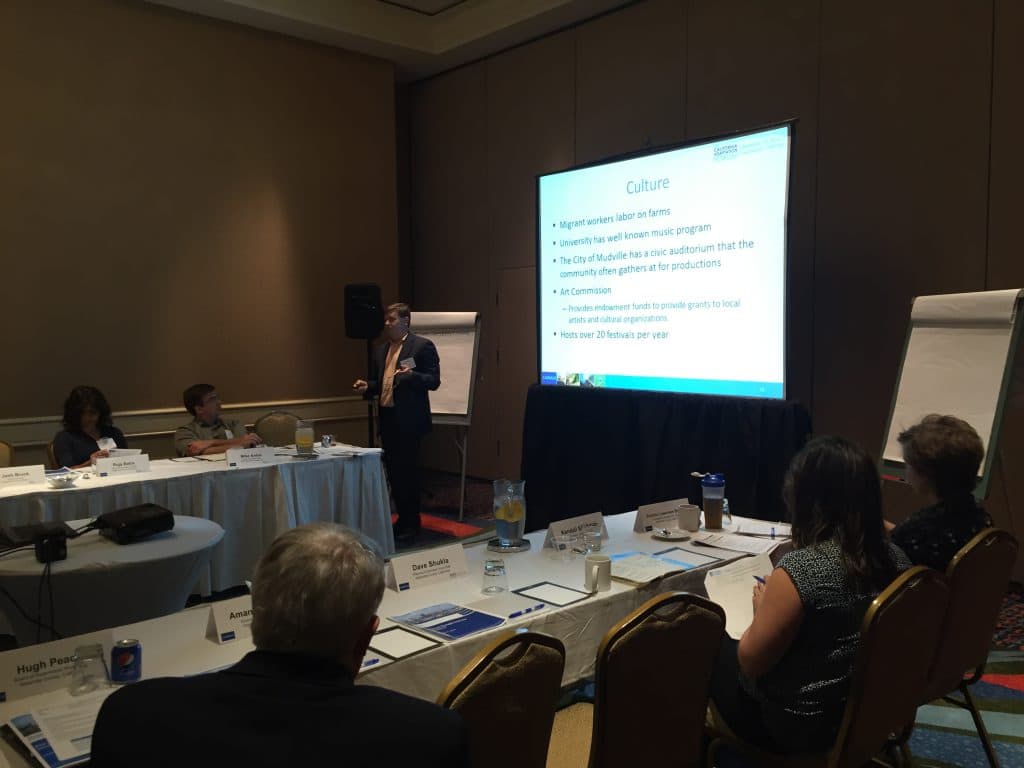California Adaptation Forum: Multi-stakeholder Drought Exercise
Cadmus’ groundbreaking multi-stakeholder drought exercise helps participants understand actions communities can take to advance sustainability and enhance resilience.

The 2nd Annual California Adaptation Forum was held on September 7–8, 2016, in Long Beach, California. Every two years, the forum convenes diverse professionals and academics working in the climate change adaptation field from across the United States. As part of the pre-forum workshop held on September 6, Cadmus was invited to host a four-hour-long discussion-based tabletop exercise. The exercise was to be interactive, facilitated by Cadmus, and hands on–to engage participants in a lively debate before the commencement of the Forum.
Challenge
Traditional homeland security exercises test the ability to respond and recover from events such as hurricanes or terrorist attacks. But in the face of a changing climate, Cadmus has been the lead consultancy to integrate multifaceted climate-related threats and hazards into its homeland security practice through the use of exercises. This drought exercise marks the latest in a series of discussion-based activities and simulations facilitated by Cadmus that incorporate scientific and data-driven scenarios, climate models, and engaging and provocative discussion questions to generate dialogue about long-term planning, investment, and adaptation decisions communities must confront.
Solution
To introduce the exercise participants to a completely hypothetical but believable reality, Cadmus built a scenario placed 10 years in the future, in the year 2026. The fictitious Waterville County, with similar demographics, climate, and economic profile to that of San Joaquin County in Northern California, was developed as the setting. The scenario had a specific focus on the fictitious city of Mudville, modeled on the city of Stockton, also with similar demographics, climate, and economy.

Exercise participants assumed pre-determined roles as members of the Waterville County Board of Supervisors. They were presented with a video, grounded in the latest science, illustrating the state of Waterville County and Mudville city in 2026, ravaged by prolonged drought and sustained economic hardship. Facilitated by Camus staff, they were guided through three discussion sections designed to design a better, more sustainable and resilient future for Waterville County. The objectives of the discussion were to:
Create a Vision
- What can a sustainable and resilient Waterville County look like in 2026?
- What indicators are needed to determine whether the vision is achieved in 2026?
- What community assets are of most value?
Prioritize Actions
- What climate mitigation and adaptation actions can stakeholders take now so that the 2026 scenario does not become a reality?
- Based on the assets identified, what specific actions are needed to achieve this vision?
- Which actions are highest priority?
Build the Business Case
- What is the business case for a more sustainable and resilient Waterville County?
- How will these actions be funded?
- What strategic messaging, acts of leadership, or campaigns are needed to build the business case to achieve the vision of a truly sustainable and resilient Waterville County?
Participants reached several important conclusions during the discussion, including the need to protect critical resources by incentivizing water conservation, invest in green infrastructure technology and the co-benefits it provides, preserve existing cultures and community values, and develop smarter and more innovative agricultural technologies in sustainable and resilient agricultural practices. By working through a realistic scenario in a hypothetical setting, participants were able to tackle problems in a hands-on way.
Results
The vigorous discussion showed that exercises are an ideal venue to explore climate-related issues and reach solutions on tough questions that are often left unanswered in the realm of climate change. Exercise participants left feeling inspired, invigorated, and committed to taking action in their communities and using exercises as a tool to pave the way. They expressed overwhelmingly positive responses to the exercise. When polled on the effectiveness of the exercise, participants gave Cadmus an average of 4.5 out of 5.
“I loved the structure and robustness of the exercise.”
– Kendall Starkman, Four Twenty Seven
“This gave me a better understanding of how to conduct exercises.”
– Jessica Rudnick, University of California Davis
Click to view our workshop materials!
Learn more about our expertise in climate security, adaptation, and resilience.